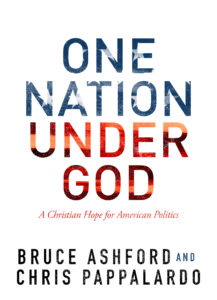
Q&A With Bruce Ashford and Chris Pappalardo, authors of One Nation Under God
By Aaron Earls
One Nation Under God (B&H Academic), the new book from Bruce Ashford and Chris Pappalardo, aims to help Christians navigate the difficult relationship between the White House and the church house, while providing a Christian hope for American politics.
Recently, Facts & Trends spoke with Ashford, provost and professor of theology and culture at Southeastern Baptist Theological Seminary, and Pappalardo, lead researcher and writer at The Summit Church in Raleigh-Durham, North Carolina, about how Christians can think through the current refugee crisis from a biblical perspective.
Facts & Trends: What are the competing priorities involved in the discussion over whether or not our nation should accept refugees from war-torn Muslim nations?
Ashford: Behind the practical question, “Should we accept these refugees?” there are two main priorities we always need to keep in mind: the first is a responsibility toward the homeless and vulnerable; the second is a responsibility to protect and care for one’s own community and nation. Some Christians emphasize the former and others emphasize the latter, but both are important. Much of the vitriol in the current conversation, unfortunately, comes from taking one of these legitimate concerns and giving it an illegitimate weight. We need both.
On one hand, we ought to be hospitable and compassionate to homeless refugees. As human beings, we are members of a global community and should therefore seek to help our fellow citizens of humanity. When one of us hurts, we all hurt.
On the other hand, we wish to seek the welfare of our own community. God specifically created us to develop and mature as members of local communities. We live not only as part of a global community, but as members of families, neighborhoods, and cities. We become who we are because of those local connections, not in spite of them. And we should protect our families, cities, and nations from potential threats. We have not only the freedom, but the duty to appropriately screen refugees, to ensure they are who they claim to be—persecuted and vulnerable individuals.
Our desire to protect our citizenry can—and too often does—manifest in feelings of xenophobia and racism. We should always be sensitive to those corruptions. But the corruption of the ideal must never erase the ideal itself. We do ourselves no favors by pretending that Christian compassion means putting wisdom aside. We are, both with this issue and others, called to be wise as serpents and innocent as doves.
F&T: What biblical values should drive our conversation about refugees?
Pappalardo: Every person is created in God’s image (Genesis 1:27) and is offered salvation through the blood of Christ (John 3:16). For this reason, we are commanded to love all persons (Luke 10:27) and act justly and mercifully toward them (Micah 6:8). We should treat them the way we would want to be treated if we were in their situation (Matthew 7:12). Too much of the contemporary rhetoric about refugees either implies or outright states we are dealing with people completely unlike us. We can’t trust “those people.” This is shameful. Refugees are people whom God created, whom God loves, and whom he expects us to love as well.
What is more, Christ will one day return to rule over a kingdom that includes worshipers from every tribe and language (Revelation 5:9-10). We might be American citizens, but primarily we are citizens of Christ’s kingdom, a kingdom that will include Syrian believers. And together we are all exiles in this world. While we certainly have a responsibility to pursue wise policies, we in the church must always ask, “How might God be at work in this to advance His kingdom?”
F&T: Is there a distinction between how individual Christians or local churches respond and how we as a nation respond to refugees? If so, how should Christians navigate those differences?
Ashford: As a general rule, local churches shouldn’t make pronouncements about public policy. Individual Christians, however, may and should argue for the view they think is right. We ought to welcome any reasonable voice in the public square that offers a way to navigate the balance we mentioned above—caring for our global community while also caring for our more local one.
However, our government offers the final say when it comes to admitting refugees. In addition to encouraging our leaders to be guided by wisdom and charity, our main role comes after the refugees arrive. Once refugees are placed in a city, local churches and individual Christians should take advantage of every opportunity to minister to the refugees, both in word and in deed.
F&T: How can we best love our local neighbor and keep them safe and love our distant neighbor and welcome them in?
Pappalardo: Love, by its very nature, is best expressed in proximity. We bear more responsibility to love our family, for instance, than to love a family we haven’t met in another nation. Most of our compassion will occur in the mundane, among those with whom we work and live. But part of that compassion should manifest in strengthening our state and federal governments in appropriate ways, so they can protect us from potential threats.
As those authorities are protecting us, we must also do our part to love our distant neighbors. Again, this can best happen in proximity. So we welcome many of those distant neighbors in, showing them hospitality and compassion.
F&T: How does the debate over refugees compare to the immigration discussion?
Ashford: The refugee debate is similar to the immigration debate in that both involve our nation’s relationship to persons who are created in God’s image and wish to seek shelter in our country. Some of these should be admitted, and some refused. But as we read the situation, the refugee debate is distinct in at least three manners.
First, refugees, by the nature of the case, generally do not enter the country illegally. To be officially recognized as a refugee, they must go through official channels. Immigrants more generally, however, may enter either legally or illegally.
Second, refugees express a markedly different motive in their immigration. Immigrants to the United States generally come—whether legally or illegally—to better their lives. Refugees seek shelter for life itself. The refugee community arises from a more urgent and more exceptional circumstance than does mere immigration, and should therefore be dealt with somewhat differently.
Finally, there are real security issues at stake because of the possibility that ISIS will try to manipulate the situation to their own advantage.
F&T: What can local churches do to love and serve refugees who may be coming to their area?
Pappalardo: Refugees arrive in their host country in a state of confusion and disorientation, having been ripped up from their communities of support. Often they are afraid and almost always they are experiencing physical and emotional trauma. Local churches can and should welcome them, feed them, and help orient them to the neighborhood and city. Churches can also provide counselors for them, invite them to worship with their congregations, and present to them Christ’s offer of salvation. Usually, this will be a difficult process, but is part of Christ’s call for Christians to love our neighbors.
For those interested in learning more about how evangelicals should respond to the growing refugee crisis, the Billy Graham Center for Evangelism at Wheaton College (BGCE) and the Humanitarian Disaster Institute at Wheaton College (HDI) have announced a summit, in partnership with Lifeway Research, to help Christians respond to the global refugee crisis. The meeting, called a GC2 Summit, will focus on leading a conversation on meeting needs, caring for, and engaging refugees around the world.
AARON EARLS (@WardrobeDoor) is online editor of Facts & Trends.










